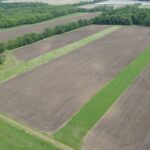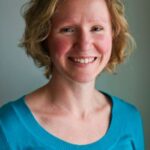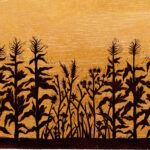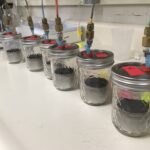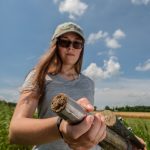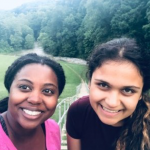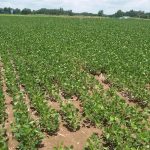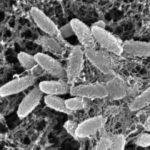CASSOPOLIS, Michigan— A farm field day centered on prairie strips and soil health will be held on Friday, August 26th (September 2nd rain date) from 1:00- 3:00 p.m. at the Edward Lowe Foundation. The field day will feature speakers including farmers, land managers, and soil scientists who will describe the implementation, management, and soil health benefits associated with on-farm prairie strips. The event is free and open to the whole family and will include a soil pit demonstration, a wagon tour of prairie strips and refreshments. This field day is supported by Michigan State
Sarah Evans named to prestigious 2022 Earth Leadership Program cohort
Michigan State University microbial ecologist Sarah Evans is one of 22 leading sustainability scientists named to the 2022 North American cohort of the Earth Leadership Program (ELP). The ELP provides outstanding academic researchers with the skills, approaches, and theoretical frameworks for catalyzing change to address the world’s most pressing sustainability challenges, emphasizing new forms of individual and collective leadership. The program enables scientists to work collaboratively with diverse stakeholders and become agents of change within and beyond their
Prairie strip ecology, art, and advocacy in the LTER: Reflections from an LTER Fellow
Corinn Rutkoski is a graduate student in Sarah Evan's lab at the Kellogg Biological Station. She is broadly interested in the use of perennials in agricultural systems, science policy, and soil health. Her research path has been propelled by a reciprocal inspiration among ecology, conservation, and creativity. In September 2018, Lisa Schulte Moore was scheduled to give a seminar at KBS titled Prairie strips improve biodiversity and multiple ecosystem services from corn-soybean croplands. At the time, I was a technician in Sarah Evans’ lab at KBS, considering graduate school
Understanding the role of microbial diversity in soil ecosystem functioning: Reflections from a LTER Fellow
Grant Falvo is a PhD student in the Plant, Soil and Microbial Sciences Department at Michigan State University. He works in the Robertson lab within the disciplines of soil microbial ecology and biogeochemistry and is interested in global change phenomena broadly. There are more microorganisms in a typical handful of soil than there are people on this planet. Every year these microbes emit >5 times as much CO2 as all the fossil fuel emissions emitted by humans. Yet recent research is beginning to uncover the dominant role these microbes play in stabilizing a similarly large
A peek at life under a wheat field: Reflections from an LTER Fellow
MSU graduate researcher, Allison Zahorec, is a PhD student in Dr. Doug Landis’s lab in the Department of Entomology at Michigan State University. When one envisions a typical midwestern farm, ‘biodiversity’ is hardly the first thing that comes to mind. Compared to more natural landscapes, agricultural lands can seem like ecological dead zones. Yet even the most intensively managed corn monocultures are teeming with life belowground. A few teaspoons of soil can contain over a billion individual organisms (largely microbes), and the diversity of soil-dwelling organisms is just as
Diving deep into soil: Reflections from an undergrad researcher
Kellogg Biological Station (KBS) LTER 2019 undergraduate summer researcher, Aista Sall, from University of South Florida. She wrote about her KBS LTER Research Experiences for Undergraduates (REU) project working in Dr. Steve Culman's lab at the Wooster Campus of The Ohio State University. The midwest has always been a place I wanted to visit, due to its natural beauty and wide range of activities that it offers. So when the opportunity presented itself for me to do a dual Research Experience for Undergraduates (REU) for the Kellogg Biological Station Long Term Ecological Research (KBS
Microbial Communities in Long Term Research: Reflections from a Field Season at KBS
Reid Longley is a PhD candidate in the MSU Department of Microbiology & Molecular Genetics. He is a member of the Bonito Lab. Reid wrote about his research at the KBS LTER, funded by a 2018 Summer Fellowships for Long-term Ecological Research. Performing my field research at the W.K. Kellogg Biological Station (KBS) this summer was the first time I had ever been exposed to work in agriculture. Before coming to Michigan State for my PhD studies, I had not thought much about the amount of science that goes into
Are we making selfish microbes?
This piece was authored by Terra Alpaugh and originally posted on the Long Term Ecological Research Network website. ~~~ Some bacteria become less cooperative with their plant hosts under long-term nutrient additions, finds new research by Jen Lau, an ecologist at the Kellogg Biological Station (KBS) LTER, and her collaborator Katy Heath at the University of Illinois. “A decade ago, no one was thinking about the idea of rapid evolution—the kind you could see over a career or even a year or two,” says Lau. Now researchers know that evolution can be measured at much smaller timescales
